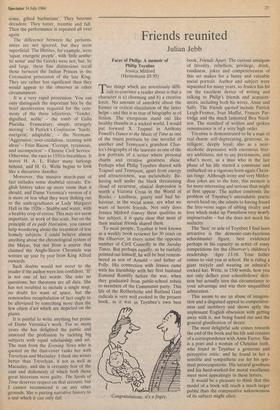Friends reunited
Julian Jebb
Faces of Philip: A memoir of Philip Toynbee Jessica Mitford (Heinemann £9.95) Two things which are notoriously diffi- cult to convince a reader about is that a character is a) charming and b) a creative force. No amount of anecdote about the former or critical elucidation of the latter helps — and this is as true of biography as of fiction. The exceptions stand out like healthy thumbs in a wicked world. I would put forward X. Trapnel in Anthony Powell's Dance to the Music of Time as one of the truest portraits by one novelist of another and Tennyson's grandson Char- les's biography of the laureate as one of the few portraits of a writer where personal charm and creative greatness shine. Perhaps what Philip Toynbee shared with Trapnel and Tennyson, apart from energy and attractiveness, was melancholy. Be- having well under the black threatening aloud of recurrent, clinical depression is worth a Victoria Cross in the World of Books — kindness, gaiety and bad be- haviour, in the social sense, are what we want of heroic friends. Not only does Jessica Mitford convey these qualities in her subject, it is quite clear that most of their mutual friends shared them.
To most people, Toynbee is best known as a weekly book reviewer for 30 years on the Observer, in every sense the opposite number of Cyril Connolly in the Sunday Times. But perhaps equally, as he ruefully pointed out himself, he will be best remem- bered as son of Arnold — and father of Polly. His connection with Jessica came with his friendship with her first husband Esmond Romilly before the war, when they graduated from public-school rebels to members of the Communist party. This life of the Rotherhithe and Rutland Gate radicals is very well evoked in the present book, as it was in Toynbee's own best 'Congratulations, it's a fogey.' book, Friends Apart. The curious amalgam of frivolity, rebellion, privilege, drink, randiness, jokes and. competitiveness of this set makes for a funny and valuable social portrait. Author and subject were separated for many years, so Jessica has hit on the excellent device of writing and talking to Philip's friends and acquaint- ances, including both his wives, Anne and Sally. The friends quoted include Patrick Leigh-Fermor, Ivan Moffat, Frances Par- tridge and the much lamented Ben Nicol- son. The standard of written and spoken reminiscence is of a very high order.
Toynbee is demonstrated to be a man of real charm: self-deprecating, generous, in- telligent, deeply loyal; also as a near- alcoholic depressive with enormous liter- ary ambitions, not to say pretensions; and what's more, as a man who in the last phase of his life started a commune and embarked on a vigorous born-again Christ- ian binge. Although irony and very Mitfor- dian jokes are to the fore, this memoir is far more interesting and serious than might at first appear. The author confronts the problem of Toynbee's unreadable poetic novels head on; she admits to having found the free-verse sagas of sibling rivalry and love which make up Pantaloon very nearly impenetrable — but she does not mock his audacity.
The 'face' or side of Toynbee I find least attractive is the demonic-cum-facetious schoolmaster figure, best evidenced perhaps in his capacity as setter of essay competitions for the Observer's children's readership. 'Ages 13-16. Your father comes to visit you at school. He is riding a giant tricycle and wearing an admiral's cocked hat. Write, in 1500 words, how you not only deflect your schoolfellows' deri- sion but actually turn this circumstance to your advantage and win their unqualified admiration.'
This seems to me an abuse of imagina- tion and a disguised appeal to competitive- ness and snobbery and shows aptly the unpleasant English obsession with getting away with it, not being found out and the general glorification of deceit.
The most delightful side comes towards the end of the book and his life and consists of a correspondence with Anne Farrer. She is a poet and a woman of Christian faith, who found in Toynbee a generous and perceptive critic; and he found in her a sensible and sympathetic ear for his spir- itual preoccupations. His natural goodness and his hard-worked-for moral excellence meet most appealingly in these letters.
It would be a pleasure to think that this model of a book will reach a much larger public than the comparative unknownness of its subject might elicit.














































 Previous page
Previous page